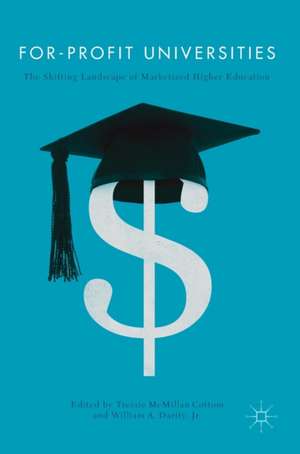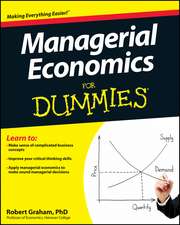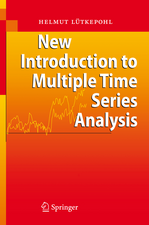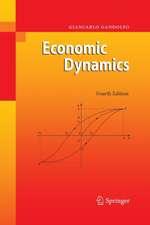For-Profit Universities: The Shifting Landscape of Marketized Higher Education
Editat de Tressie McMillan Cottom, William A. Darity, Jr.en Limba Engleză Hardback – 10 apr 2017
| Toate formatele și edițiile | Preț | Express |
|---|---|---|
| Paperback (1) | 635.80 lei 6-8 săpt. | |
| Springer International Publishing – 21 iun 2018 | 635.80 lei 6-8 săpt. | |
| Hardback (1) | 890.68 lei 6-8 săpt. | |
| Springer International Publishing – 10 apr 2017 | 890.68 lei 6-8 săpt. |
Preț: 890.68 lei
Preț vechi: 1086.20 lei
-18% Nou
Puncte Express: 1336
Preț estimativ în valută:
170.49€ • 185.25$ • 143.30£
170.49€ • 185.25$ • 143.30£
Carte tipărită la comandă
Livrare economică 21 aprilie-05 mai
Preluare comenzi: 021 569.72.76
Specificații
ISBN-13: 9783319471860
ISBN-10: 3319471864
Pagini: 236
Ilustrații: XIV, 224 p. 39 illus.
Dimensiuni: 148 x 210 x 14 mm
Greutate: 0.44 kg
Ediția:1st ed. 2017
Editura: Springer International Publishing
Colecția Palgrave Macmillan
Locul publicării:Cham, Switzerland
ISBN-10: 3319471864
Pagini: 236
Ilustrații: XIV, 224 p. 39 illus.
Dimensiuni: 148 x 210 x 14 mm
Greutate: 0.44 kg
Ediția:1st ed. 2017
Editura: Springer International Publishing
Colecția Palgrave Macmillan
Locul publicării:Cham, Switzerland
Cuprins
1. Introduction.- 2. What is the Difference? Public Funding of For-Profit, Not-for-Profit, and Public Institutions.- 3. For-Profit Higher Education in the United Kingdom: The Politics of Market Creation.- 4. For-Profit Universities through the Eyes of the Integrated Postsecondary Education Data System: Warts and All.- 5. Social Capital and For-Profit Post-Secondary Institutions: A Planned Study.- 6. Stratification and the Public Good: The Changing Ideology of Higher Education.- 7. Who Attends For-Profit Institutions? The Enrollment Landscape.- 8. Enrollment and Degree Completion at For-Profit Colleges versus Traditional Institutions.
Notă biografică
Tressie McMillan Cottom is Assistant Professor of Sociology at Virginia Commonwealth University, USA, and a Faculty Associate at the Berkman Center for Internet & Society, Harvard University, USA. She is a former Fellow at the Center for Poverty Research at the University of California, Davis, USA, and at the Microsoft Social Media Collective.
William A. ("Sandy") Darity, Jr., is Samuel DuBois Cook Professor of Public Policy, African and African American Studies, and Economics, and Director of the Samuel DuBois Cook Center on Social Equity at Duke University, USA. He has served as Chair of the Department of African and African American Studies and was the founding Director of the Research Network on Racial and Ethnic Inequality at Duke.
Contributors
Victor H.M. Borden, Indiana University, USA
Bonnie K. Fox Garrity, Accord Integrated Academic and Financial Integration, USA
David J. Harding, University of California, Berkeley, USA
Thomas A. Mays, Miami University, USA
Jane Rochmes, Stanford University, USA
Rhonda Vonshay Sharpe, Bucknell University, USADavid Diego Torres, Rice University, USA
Gaye Tuchman, University of Connecticut, USA
Jonathan White, University and College Union, UK
Textul de pe ultima copertă
This edited volume proposes that the phenomenon of private sector, financialized higher education expansion in the United States benefits from a range of theoretical and methodological treatments. Social scientists, policy analysts, researches, and for-profit sector leaders discuss how and to what ends for-profit colleges are a functional social good. The chapters include discussions of inequality, stratification, and legitimacy, differing greatly from other work on for-profit colleges in three ways: First, this volume moves beyond rational choice explanations of for-profit expansion to include critical theoretical work. Second, it deals with the nuances of race, class, and gender in ways absent from other research. Finally, the book's interdisciplinary focus is uniquely equipped to deal with the complexity of high-cost, low-status, for-profit credentialism at a scale never before seen.
Caracteristici
Studies how students move through institutional sectors in higher education Compares the roles and social effects of for-profit and non-profit colleges and universities Systematically analyses the operation and impact of proprietary institutions of higher education











